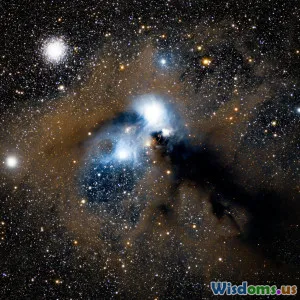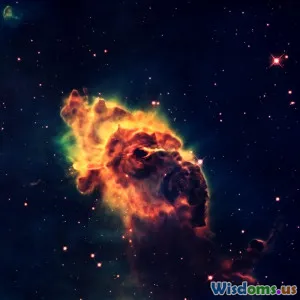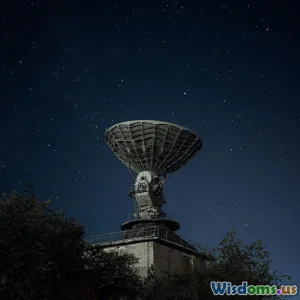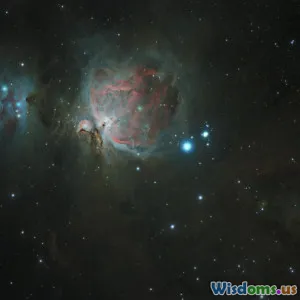
Why Scientists Rethink the Classic Big Bang Theory
9 min read Explore the evolving perspectives challenging the Big Bang theory and the groundbreaking science reshaping our understanding of the universe's origin. (0 Reviews)
Why Scientists Rethink the Classic Big Bang Theory
The Big Bang theory has long stood as the cornerstone of modern cosmology, narrating the universe's explosive birth from a singularity roughly 13.8 billion years ago. This grand story not only echoes through textbooks but also frames much of our understanding of the cosmos—from galaxy formation to cosmic microwave background radiation.
Yet, in recent years, a quiet revolution has stirred within the scientific community. Researchers are taking a fresh look at the Big Bang, questioning its completeness and wrestling with anomalies that resist easy explanation. The universe, it seems, may still hold secrets challenging the foundational assumptions of this classic cosmological model.
The Big Bang Theory: A Brief Overview
Developed through the 20th century and bolstered by Edwin Hubble’s observations of galactic redshifts and the serendipitous discovery of the Cosmic Microwave Background (CMB) by Penzias and Wilson in 1965, the Big Bang theory provided a robust explanation for an expanding, cooling universe. It explains the abundance of light elements such as hydrogen and helium, alongside the uniform background glow felt as the universe's residual heat.
Despite its successes, the theory relies on certain suppositions, including the existence of dark matter and dark energy — mysterious components that make up around 95% of the universe’s content but remain unobserved directly.
Growing Anomalies and Tensions
The Hubble Constant Discrepancy
One of the most prominent challenges accusing the classic model of incompleteness is the discrepancy in the measured expansion rate of the universe, quantified as the Hubble constant (H₀). Traditional cosmology derived from the CMB measured by the Planck satellite estimates the Hubble constant at around 67.4 km/s/Mpc. In contrast, measurements based on local observations, such as Cepheid variable stars and Type Ia supernovae, consistently return a higher value near 73 km/s/Mpc.
This tension exceeds the combined error margins of the two methods, signifying a profound puzzle. It hints that perhaps our understanding of the universe’s early parameters or physics might be incomplete or even flawed.
The CMB Cold Spot and Large-Scale Structure Anomalies
Another curiosity is the CMB Cold Spot—an unusually large region of the sky colder than the surrounding areas, detected by the Wilkinson Microwave Anisotropy Probe (WMAP) and Planck data. While it could be a statistical fluke, some suggest it might hint at exotic physics or previously unknown cosmic structures.
Additionally, observations of large-scale structures, such as galaxy superclusters and voids, sometimes appear more massive or sparsely distributed than simulations based on the Big Bang model predict.
Alternative Models Challenging the Status Quo
Inflationary Universe and Its Challenges
Inflation theory, a rapid exponential expansion moments post-Big Bang proposed by Alan Guth, attempts to solve several problems like horizon and flatness issues. However, inflation introduces its own quandaries, such as fine-tuning and the absence of a definitive inflationary mechanism in particle physics.
Recent research efforts delve into alternatives such as "warm inflation" or models incorporating quantum gravity effects to buttress or revise traditional inflationary scenarios.
Bounce and Cyclic Universes
Some cosmologists investigate models where the universe undergoes cycles of expansions and contractions, or "bounces," negating the idea of a singular, absolute beginning. Theories like the ekpyrotic or conformal cyclic cosmology propose scenarios in which the universe’s current expansion phase was preceded by a contraction or another universe’s demise.
Roger Penrose’s conformal cyclic cosmology, for example, suggests that signals from a prior universe could even be imprinted on the CMB—pushing the envelope of what the Big Bang might represent.
Quantum Gravity and String Theory Insights
Attempts to unify general relativity and quantum mechanics offer another avenue for potentially revising or extending the Big Bang model. Loop quantum gravity proposes scenarios where the universe bounces back from a previous contracting phase, while string theory frameworks envision a multiverse with an ensemble of different cosmic births.
New Observations Driving Rethinking
The James Webb Space Telescope (JWST) Revelations
Since its deployment, JWST has unveiled surprisingly mature galaxies and structures existing when the universe was less than 500 million years old—far sooner than classical Big Bang models predicted. These observations challenge the timeline for star formation and galactic evolution.
These insights force theorists to reconcile early rapid structure formation with the classic cosmological timeline.
Dark Energy and Matter Mysteries
Dark energy accelerated cosmic expansion, first discovered in 1998, remains enigmatic. Variations or unexpected properties of dark energy could require revising classical assumptions about how the universe has evolved—or fundamentally change the Big Bang framework itself.
Additionally, experiments like the Xenon1T and the Large Hadron Collider continue to search for dark matter particles, which, if detected, would deepen or radically shift cosmological theories.
The Scientific Process: Embracing Uncertainty and Progress
These debates exemplify the scientific spirit—openness to new data, reexamination of prevailing models, and pursuit of deeper understanding. As Dr. Priya Natarajan, a renowned cosmologist, remarked:
"Cosmology is at an exhilarating crossroads, where every new observation can affirm or overturn our grandest ideas about the origin and fate of the universe."
Far from undermining science, such reexaminations push humanity’s grasp of the cosmos forward.
Conclusion: A Big Bang Beyond Big Bang?
While the Big Bang theory remains a successful baseline for describing the cosmos, growing tensions and enigmatic data compel scientists to rethink its completeness and adequacy. Alternative models grounded in cutting-edge physics, combined with increasingly precise observations — from ground-based telescopes to space observatories — are reshaping the cosmic story.
The universe may be stranger and more complex than the elegant Big Bang narrative has suggested. Yet this journey of discovery illuminates the awe-inspiring drive of humanity to understand our cosmic origins, reminding us that science flourishes in questions as much as in answers.
As observations refine and theoretical tools sharpen, the coming decades promise profound progress in unlocking the secrets of the universe’s earliest moments, perhaps leading to an even bigger bang for our cosmic buck.
References:
- Riess, A.G., et al. (2019). "Large Magellanic Cloud Cepheid Standards Provide a 1% Foundation for the Determination of the Hubble Constant and Stronger Evidence for Physics Beyond ΛCDM." ApJ, 876(1). https://doi.org/10.3847/1538-4357/ab1422
- Penrose, R. (2010). Cycles of Time: An Extraordinary New View of the Universe. Bodley Head.
- Planck Collaboration (2020). "Planck 2018 results. VI. Cosmological parameters." A&A, 641, A6.
- JWST Early Release Science (2023). Various galaxy observations. https://jwst.nasa.gov/
- Verde, L., Treu, T., & Riess, A. G. (2019). "Tensions between the Early and the Late Universe." Nature Astronomy, 3(10), 891–895.
Rate the Post
User Reviews
Popular Posts



















